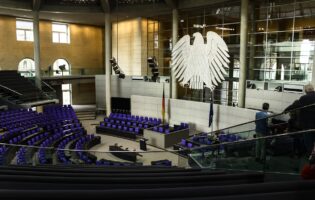Two Steps Forward, One Step Back: Germany Rethinks Its Security Policy

Gale Mattox
Senior Fellow
Dr. Gale A. Mattox is a Senior Fellow at AGI. She was previously Director of the Foreign & Security Policy Program at AICGS and a Professor in the Political Science Department at the U.S. Naval Academy. She is a former elected department chair and chair of chairs, and was awarded the Distinguished Fulbright-Dow Research Chair at the Roosevelt Center in the Netherlands 2009, Fulbright Scholar for NATO Strategic Studies in Brussels in Summer 2017, and Woodrow Wilson International Center for Scholars Fellow in 2016-17. Dr. Mattox served on the Policy Planning Staff of the Department of State, was a Council on Foreign Relations Fellow at the State Department Office of Strategic and Theater Nuclear Policy, and an International Affairs Analyst at the Congressional Research Service.
She has been a Bosch Fellow in Germany (also Founding President of the Bosch Alumni Association), NATO Research Fellow, and a Fulbright PhD Scholar. Dr. Mattox has held the offices of President (1996-2003) and Vice President of Women in International Security (WIIS); Adjunct Professor, Center for Peace and Security Studies at Georgetown University; and served as Vice President of the International Studies Association and co-chair of the ISA Women’s Caucus.
She has served on numerous boards, including the Tactical Advisory Council, Center for Naval Analysis, and the George Marshall Center Advisory Board in Germany; the advisory boards of St. Mary’s College Women’s Center, the Forum for Security Studies at the Swedish National Defense University, and WIIS. Dr. Mattox published Coalition Challenges in Afghanistan: The Politics of Alliance with S. Grenier, Enlarging NATO: The National Debates with A. Rachwald, and Evolving European Defense Policies with C. Kelleher. She is the co-editor of Germany in Transition, Germany at the Crossroads, and Germany Through American Eyes, and has published widely in scholarly journals. She holds numerous awards and has appeared on the Lehrer News Hour and other media outlets. She holds a PhD from the University of Virginia.
__
At the Munich Security Conference in 2014, German President Joachim Gauck challenged the Federal Republic to assume greater responsibility in security policy, emphasizing German leadership in conflict prevention, but also encouraging his country to take broader leadership internationally.[1] Foreign Minister Frank-Walter Steinmeier and Defense Minister Ursula von der Leyen also took forward-leaning positions on the need to rethink aspects of German policy in the fields of foreign and defense policy. Difficult to miss was the underlying similarity between the three speeches. Also deafening was the absence of comment from Chancellor Angela Merkel. That the three intended to move the German debate in the direction of more international involvement in the area of security policy appeared clear. But also hard to miss over the past year has been the fact that the debate and any changes will be slow and only evolve in a deliberate manner—taking two steps forward and one step back—as Germany calibrates its future security role first within Europe and second as an actor internationally.
As the initial speaker, Gauck framed the discussion by pointing to “new tensions and new wars”[2] and posed the question, “I don’t believe Germany can simply carry on as before in the face of these developments. The key question is: has Germany already adequately recognized the new threats and the changing structure of the international order? Has it reacted commensurate with its weight? Has Germany shown enough initiative to ensure the future viability of the network of norms, friends, and alliances which has after all brought us peace in freedom and democracy in prosperity?”[3] Furthermore, Germany, he maintained, must be “an equal partner with equal responsibilities.”[4]
With this impulse, the debate over greater German leadership on security issues faced in the international arena moved center stage—i.e., two steps forward.
But German cautiousness about taking center stage, especially in the area of security policy, brought the debate back a step over the course of the past year—particularly with the lack of any articulated remarks from Chancellor Merkel. Per her traditional caution, the chancellor has not voiced a position in the subsequent discussion of the future German role, but she has stood out in the role she has assumed on Ukraine and with Russian President Vladimir Putin. Over the year, peaceful demonstrations in Ukraine have evolved into a virtually full-fledged civil war with over 2,000 military and up to 4,000 civilian casualties and widespread destruction as Crimea has been seized by Russia and Eastern Ukrainian forces have been reinforced with hardly disguised Russian soldiers. In fact, many countries have called the Russians out on its use of so-called “little green men” and the Organization for Security and Cooperation in Europe (OSCE) recently noted the presence of Russians in the contested eastern Ukraine arena.[5] The Ukrainian crisis has heightened tensions in the central European area as Russians have threatened the Baltic and Nordic states with flyovers and unsettling movements resulting in discussions over a more visible NATO presence[6] and, more recently, decisions to enhance exercises and preposition material in the region. The United States has introduced rotating troops to the area. Beginning in 2016, reports are that German infantry troops may rotate as well, representing a recognition that the instability in the region threatens the entire continent.
Merkel’s inclination has been to approach the Ukrainian crisis in terms of diplomacy by taking the lead with near weekly calls to Putin. She has also publicly warned other leaders, including President Barack Obama, that Putin is not to be trusted.[7] As a member of the Weimar Triangle with Poland and France, Germany has attempted diplomatic solutions to the Ukrainian crisis through its traditional skills of conflict resolution. German as well as allied frustration has grown—particularly with the downing of the MH17 flight in July 2014 and heightened fighting in eastern Ukraine—but direct involvement has been avoided by Germany as well as others, limited to enhanced exercises and regional, not direct, presence. At this point, the efforts to resolve the conflict through diplomacy and two Minsk agreements have not halted the fighting, nor have they moved the situation closer to a political solution.[8] Even Poland has called for more German leadership. Standing in front of the Brandenburg Gate, Polish Foreign Minister Radosław Sikorski commented that “I fear German power less than I am beginning to fear German inactivity.”[9]
Review: Crisis, Order, Europe (and the U.S.?)
In Munich in 2014, Foreign Minister Steinmeier echoed President Gauck’s remarks in terms of foreign policy, an overlap with both the president and defense minister (below) that was difficult to overlook except in one respect—mention of the United States. Whereas Defense Minister von der Leyen addressed transatlantic relations in a number of public remarks, Foreign Minister Steinmeier was reticent in commentary with respect to the U.S., with scant mention (four times substantively in nearly fifty pages) in the year-long study undertaken by the ministry. Whether this reflects the German dismay over the U.S. National Security Agency operations and other tensions over the past year is unclear but troubling. The final 2015 Review: Crisis, Order, Europe represents a new and interesting approach to German foreign policy but falls short of its potential in failing to address its U.S. ally.
Over the past year Steinmeier’s Review 2014: A Fresh Look at Foreign Policy has opened a foreign policy debate over its stated objective to take “a critical look at foreign policy.” In an interesting outreach also to the broader public, the website created for the subsequent study asked “What is wrong with German foreign policy? What needs to be changed?” In blogs, tweets, and even videos, the public responded with their views. Steinmeier hosted a series of dinners for fifty foreign policy experts with international representation to explore the issue as well. In one of many commentaries, Jan Techau, Director of Carnegie Europe for the Carnegie Endowment for International Peace, commented on German responsibility: “[T]here needs to be a sea change in the debate over foreign and security policy in Germany. […] Because of their excessive need for moral clarity, Germans find these balancing acts almost unendurable. This causes them to compulsively attempt to avoid choosing. The result is a culture of passivity, fence-sitting, and rejection of any active role in international politics, particularly on issues concerning military deployments.”[10]
While calling for “a fresh look at foreign policy”[11] the Review has reframed the issues at stake, but does not represent substantial change. Rather, institutional changes have been introduced that reflect a more global approach but cannot be considered more than modest.
Issued in early 2015, Review: Crisis, Order, Europe does set itself an impressive starting point: “In a world that is still searching for a new order 25 years after the end of the East-West confrontation and the demise of a black-and-white order that had prevailed for decades, German foreign policy has no choice but to call itself into question.”[12] Change has focused on its toolkit for “prevention, for early warning, for crisis management”[13] as well as better use of civilian capacities. A new Directorate-General institutional framework for foreign policy allows a discourse on responsibility to take place, but, the study notes, it is “not a task that can ever be completed or entirely fulfilled.”[14] Although calling the effort “[…] an unprecedented exercise in working out a new orientation in a dramatically changing world,”[15] the overall thrust is cautious and lacks the bold promise of a critical review to redesign foreign policy. An interesting focus of the study is the importance of Europe and, within this, a more pronounced partnership with France,[16] a partnership that has not been close most recently. The study’s broad emphasis on Europe is clear, as is the need to recognize that there are limitations to what can be achieved by Europe.
While the Review prompted an impressive process and dialogue on German foreign policy, the conclusions fall short of a grand design for change and only tangentially even a further process for transformation. Instead, Review conclusions reflect the caution for which Germans are known. The new Director-General is established to create a “networked approach,” building on a concept developed gradually over the past decade and adapted to the needs of the foreign ministry that emphasizes negotiators, conflict mediators, and reconstruction experts with a “crisis pool” built in and enhanced capabilities for peace keeping in Europe and internationally. A state secretaries committee will focus on issues of international order, e.g., OSCE, EU, UN, G20, and others. Further conclusions call for better communication externally and internally, but striking is the call for anchoring the “European Reflex” more firmly in German diplomacy, including specifically European foreign and security strategy. Could this presage an impetus for the EU operations and strategy that has languished with the conflicts in Afghanistan and Ukraine? Particularly striking is the study’s failure to link this European focus to the transatlantic framework within which Germany has prospered.
Evolution of German Bundeswehr in Afghanistan: From Caveats to Deputy Command, Resolute Support
In terms of political will, “evolution, not revolution,” as Minister von der Leyen began her Brussels Forum 2015 remarks, has marked the German approach with respect to use of force by the Bundeswehr.[17] Most strikingly, the German Armed Forces have broadened their operational capabilities over the past decade as an International Security Assistance Force (ISAF) coalition member and Regional Command – North lead. Within this multilateral NATO framework of almost fifty states, caveats and restrictions set parameters for Bundeswehr participation (particularly in its initial phases in Afghanistan), yet Germany has evolved not only in its operational skills, but also has gained respect for leadership on the ground.[18]
Not to let the foreign ministry define the discussion alone, the defense minister initiated a review of the armed forces in October 2014 to begin discussions for a new White Paper[19] including, among other things, addressing and “redefining the relationship with Russia.” Russia, she commented to Deutsche Welle, has replaced internationally agreed rules and rights with dominance and spheres of influence. It is important to re-establish a reliable relationship.[20] The White Paper review would lay out Bundeswehr strategy and mission and be a significant indication of its direction for the future. This will be the most recent White Paper since that in 2006 that reflected the Afghanistan deployment and the eleventh since 1969 for the Federal Republic.
As has been true for the foreign ministry, the defense review will be accompanied by a website on which elites as well as the public can weigh in with commentary.[21] Four major perspectives will be highlighted:
- Security and Defense Policy,
- Partnerships and Alliances,
- National Framework, and
- Armed Forces, or Bundeswehr.
Reconceptualizing German leadership in defense and security policy has continued to be a theme articulated by Minister von der Leyen and was reflected at the Munich Security Conference this year as she outlined the need for “leadership from the center.”[22] But what kind of leadership? Her answer is to “contribute one’s best resources and capabilities to alliances and partnerships,”[23] in particular citing NATO, the European Union, and the Organization for Security and Cooperation in Europe (OSCE). But important is not just the capability, but also the will to act.
The clear answer to the simple question of Germany’s will to act is yes, but the willingness to strengthen capabilities to do so often has lagged behind the political will to boost the budgets to do so. After promises to bring home any infected volunteers working on the Ebola effort in West Africa, the lack of an adequate transport required a quick fix. The transport of materials to the Peshmerga Kurds fell short as a result of mechanical difficulties, made more striking by the presence of the defense minister and press awaiting the transport. There is no shortage of mechanical difficulties in the defense field, but inadequate defense budgets are a longstanding problem, intensified during an age of international challenge from all sides. It is here that the new White Paper will be critical to the sentiment expressed by President Gauck and Ministers von der Leyen and Steinmeier for Germany to demonstrate leadership—as von der Leyen commented at the March 2015 Brussels Forum, “evolution, not revolution” have marked the past year since the 2014 Munich Security Conference commentaries by all three. In the fight against ISIS, the Germans have now armed and trained the Kurdish Peshmerga, transferring “about 1,800 tons of arms, ammunition, equipment, and supplies to the Kurdish Peshmerga by the end of May 2015,”[24] which, as von der Leyen commented, broke longstanding taboos. Germany has also participated at lower levels in Mali, Somalia, along the Turkish border with Patriots, and elsewhere.
Striking has been the focus on Europe both by Steinmeier’s Review: Crisis, Order, Europe and von der Leyen in a Brussels speech recently. The defense minister addressed a European army and pointed to the development of a number of European partnerships—high readiness headquarters in Stettin, Franco-German Brigade in Mali, naval cooperation with Poland (with each having units under the other’s command), assignment of the Dutch airborne brigade to a German division, even Bundeswehr multinational tank battalion and helicopter units—all contributing to NATO as well as strengthening European Defense and Security Policy, which is “good for Europe, good for the Transatlantic Partnership and good for the Alliance.”[25] Her discussion of a European Army floated by President of the European Commission Jean-Claude Juncker this spring, prompted mixed reactions in Europe, particularly by the Brits, who were not enthusiastic. Even for the Germans who expressed interest in pursuing this concept, the question of sovereignty embedded in the Basic Law (the German Constitution) would need to be carefully resolved for a truly “European Army.”
Does this issue presage public support for more German deployments abroad within a European context that has languished in the recent past? Again, as in the Review of foreign policy, the increase in greater responsibilities abroad are evident, but the evolution is and will be only gradual. The assumption of deputy command for Resolute Support in Afghanistan and a parliamentary mandate for deployment of up to 850 troops (part of a total of approximately 12,000 remaining in Afghanistan as a training mission) received an impressive vote of 473 parliamentary votes, 102 opposing, and 18 abstentions at the end of the year 2014. Specifically, Defense Minister von der Leyen has emphasized that non-combat forces will be either in Mazar-i-Sharif or Kabul to conduct training and not engage in combat (the mission for Resolute Support). Moreover, a Parliamentary mandate was also given to German participation in Operation Active Endeavor, which was stood up as an anti-terror effort following 9/11 to patrol the Mediterranean Sea.
The Ruehe Commission: Parliamentary Responsibility Tightened?
Established in March 2014 by the Parliament, the Ruehe Commission reported out its “Review and Safeguarding of Parliamentary Rights regarding Mandates for Bundeswehr Missions Abroad” in mid- June 2015[26] with nonbinding recommendations unless adopted by the Bundestag. The report surprised some who expected the commission to recommend less stringent oversight for troop deployments into areas of active conflict. Headed by a former CDU defense minister, Volker Ruehe, and a former Member of Parliament for the SPD, Walter Kolbow, the commission instead reinforced the role of the Bundestag with respect to the deployment of troops outside Germany. While the smaller opposition parties (the Greens and the Left) declined to participate in the commission[27] and the CDU had reportedly supported greater flexibility by the Bundestag, the report authors did not change the need for parliamentary approval of Bundeswehr forces to deploy or particularly streamline the process. It proposed enhanced support for the ability of forces to honor alliance obligations, i.e., NATO, EU, or UN deployments.[28] Further discussions with respect to these deployments are recommended as well, including directly with the allied partners while also keeping national contributions “identifiable” within multilateral structures.
In fact, the Bundeswehr is so cautious of its mandate requirement that it typically deploys even fewer troops than approved by the Bundestag, avoiding any potential for transitioning troops to chance going over the allowable numbers by even a few soldiers. There has purportedly not been a single incident in over twenty years since the 1994 Federal Constitutional Court decision where a requested mandate to deploy internationally has been denied—of approximately 140 requests—and usually the requested parliamentary mandate has been granted within only a few days.
Not only has the parliamentary role not been lessened, in the case of Special Operations deployment, the report recommends a required, rather than voluntary, report to the Bundestag. Furthermore, at the end of deployments, it recommends that the government submit an evaluation/lessons learned from the mission in terms of successes and shortcomings. Additionally, the defense ministry/government would submit an assessment of all international engagements to the Bundestag. At the same time, four areas will no longer necessitate a mandate as long as any arms are only employed for self-defense: logistical assistance, humanitarian aid, medical support, and educational missions.[29] While the commission recommendations are strictly nonbinding, the establishment of the commission in itself indicates ongoing debate over parliamentary responsibilities in troop deployments as Germany moves toward an enhanced role in the international arena.
Reflections
As in the EU fiscal policy leadership assumed by Chancellor Merkel over the recent years, the security challenges today in the international arena require—even demand—response and leadership. The clearly coordinated speeches in 2014 at the Munich Security Conference by President Gauck as well as the defense and foreign ministers articulated this need for greater involvement and an enhanced international leadership role for Germany in the future. Ministers Steinmeier and von der Leyen have opened the lines of communication with the public as well as the elite through their thoughtful reviews of their respective missions—in the case of the foreign ministry with the study Review: Crisis, Order, Europe and in the case of the defense ministry with the ongoing defense study for a White Paper to appear next year.
President Gauck has framed the German debate, but a number of issues remain. First, what is the current threat on the European continent and what is the German role in resolving the threat? Second, what is the broader international threat and what should the German role be? Third, is there a political will to expend resources to address the challenges to German security?
While the foreign ministry has begun the process of restructuring its organization to be able to respond to the myriad European and international threats, it will need to expand its horizon to include the United States and the role of the transatlantic alliance more prominently in its considerations. No doubt the recent events have strained German relations with the United States, but that does not change the fundamental values and shared security concerns. We need greater openness; the past few years’ issues in the area of intelligence have demonstrated the need. But for the foreign ministry to limit mention of the United States in its 50+ page review is to short-change the important U.S.-German allied security relationship.
The German Armed Forces have developed considerable operational capabilities in Afghanistan, off the coast of Somalia, and in the Mediterranean, not to mention other more limited deployments. Hopefully the White Paper due in 2016 will demonstrate as well the political will and expectations for an enhanced future German role, certainly its role within the transatlantic alliance. German responsibilities are demanding even today as it has assumed Deputy Command, Resolute Support in Afghanistan, as well as Chief of Staff, NATO Command Center Stettin (Szczecin) for the Baltic region, the closest NATO rapid deployment command to Russia and will host a new NATO unit which will include up to 1,000 German troops.[30] According to the Financial Times, the public support for increased defense spending is evident with 49 percent in favor and 37 percent against.[31] The proposed 6 percent budget increase over five years is welcome, but substantially reduced troop numbers, shortfalls in new weapons procurements, and poor maintenance of existing systems will require leadership from the top if Germany is to step up to greater responsibilities.
There is no doubt that Chancellor Merkel has in her quiet manner launched the discussion of German leadership in the myriad security challenges confronting the country today. The process promises to be slow and deliberate—two steps forward and one step back—as Germany recalibrates its security policy for the future.
[1] Gale Mattox, “The Opening Shot in a German Security Debate?” AGI Transatlantic Perspectives, 30 June 2014.
[2] President Joachim Gauck, “Germany’s Role in the World: Reflections on responsibility, norms and alliances,” Speech at opening of the Munich Security Conference, 31 January 2014.
[3] Ibid.
[4] Ibid.
[5] OSCE, Reports from the Observer Mission at the Russian Checkpoints Gukova and Donetsk. See numerous reports, e.g., June 11, May 28, May 21, May 14, and other convoys in the OSCE reporting.
[6] Not only did Russians threaten the Baltic States, but in February 2015 they flew Tupolev TU-95 bombers (aka Bears) in international airspace very close to Cornwell, UK. Sweden and Finland also experienced encounters with Russian fighters.
[7] Merkel biographer Stefan Kornelius commented to the Los Angeles Times that Merkel said of Putin “he can reverse everything he says within minutes, pretty much saying he’s a liar.” See Robyn Dixon, “As NATO Talks Near, Merkel Appears to Be Losing Patience with Putin,” LA Times, 3 September 2014.
[8] Minsk Agreement on Ukraine Crisis: Text in Full, Telegraph, 12 February 2015. See also, “Ukraine First Minsk Agreement,” Kyiv Post, 22 September 2014.
[9] Radoslaw Sikorski,. Poland and the Future of the European Union, Speech, Berlin, 29 November 2011.
[10] Foreign Minister Frank-Walter Steinmeier, Review 2014: Aussenpolitik Weiter Denken (Berlin: Federal Foreign Office, 2014).
[11] Ibid.
[12] Foreign Minister Frank-Walter Steinmeier, Review: Crisis, Order, Europe (Berlin: Federal Foreign Office, 2015), p.16.
[13] Ibid., 44.
[14] Ibid., 5.
[15] Ibid., 13.
[16] Ibid., 8.
[17] Foreign Minister Steinmeier has also referred to “evolutionäre Veränderung”over the past year.
[18] But confidence in the Bundeswehr has grown, according to a Koerber TNA Infratest survey last year that found a shift to a majority support for the under 29 year old respondents on deployment of German forces abroad for humanitarian purposes to be gaining while only 66 percent overall supported such deployment. In response to use of forces abroad when allies are directly threatened, 70 percent considered deployment justified. See Foreign Minister Frank-Walter Steinmeier, Review: Crisis, Order, Europe (Berlin: Federal Foreign Office, 2015), p.2.
[19] Previous White Papers were published in 2006 and 1994.
[20] Deutsche Welle, “Germany kick starts work on a new White Paper,” 2 February 2015.
[21] See the German defense ministry site.
[22] Defense Minister Ursula von der Leyen, Leadership from the Centre, Speech at the Munich Security Conference, 6 February 2015.
[23] Ibid., 2.
[24] Stephen Wallace, Germany Steps up Military Aid to Kurdish Forces in Iraq, AGI Commentary, 19 June 2015.
[25] Ursula von der Leyen, The Evolving European Army, Speech at the 10th Brussels Forum of the German Marshall Fund, 20 March 2015, p.2.
[26] See Deutscher Bundestag, “Unterrichtung durch die Kommission zur Ueberpruefung und Sicherung der Parlamentsrechte bei der Mandatierung von Auslandseinsaetzen der Bundeswehr” 18. Wahlperiode, Drucksache 18/5000, 18 June 2015 (Initiated by Bundesdrucksache 18/870, 20 March 2014)
[27] Note: the Greens have taken a more stringent stance with respect to deployments while the Left (die Linke) have rejected those deployments on principle. The discussions also included representatives of ministries and academics/outside members.
[28] Also maintained has been the possibility to “fast track” a mandate by accepting it without debate although this option has been blocked to date by the opposition.
[29] There has been some debate over this latter area in the case of an educational mission to Mali where there was an ongoing conflict in the north while the German educational mission conducted training in the south.
[30] Stefan Wagstyl, “Security fears put German Military on Guard,” Financial Times, 1 April 2015, p.4. The new NATO unit planned for eastern Europe will host 1,000 (of 5,000) troops will be a Very High Readiness Joint Task Force and will eventually grow to 30,000 troops.
[31] Ibid., 4. Note that a Koerber Foundation poll in 2014 cited in the foreign ministry Review: Crisis, Order, Europe differed: “assuming responsibility in international crises” showed only 37 percent of Germans in 2014 believed that Germany should be more engaged (down from 62 percent in 1994) and 60 percent believed that Germany should continue to exercise restraint (up from 37 percent in 1994). Clearly, as the Review notes, this reveals a new generational shift. Issues on which the public is willing to be engaged in 2014 range from a long-standing humanitarian assistance (86 percent), to diplomatic negotiations (85 percent), to projects to strengthen civil society and promote arms control (80 percent). Less support is indicated for taking in refugees (47 percent), and military operations by the Bundeswehr as well as supplying arms to allied countries (13 percent).









